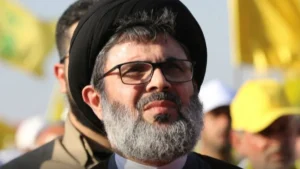With his statements on cooperation with the AfD in the municipalities, Merz triggered a wave of indignation in his own party. Now he’s trying to limit the damage.
Finally, even CSU boss Markus Söder speaks up. Actually, there is currently a kind of harmony between him and CDU leader Friedrich Merz. The realization that mutual attacks only do harm is still fresh. But on Monday morning, Söder also distanced himself from Merz. “The CSU rejects any cooperation with the AfD – regardless of the political level,” he tweeted.
Previously, numerous prominent Christian Democrats had already openly criticized party leader Merz – from Berlin’s Governing Mayor Kai Wegner to the former Saarland Prime Minister Tobias Hans to Yvonne Magwas, Vice President of the Bundestag. They all emphasized that there should be no cooperation with the AfD, no matter where.
The critics came not only from the camp of those who uphold the legacy of former Chancellor Angela Merkel. It was a wave of indignation that Friedrich Merz should not have expected and which is probably quite unique. When has it ever happened that a party leader was publicly counted from his own ranks after an interview?
Merz had explained in the ZDF summer interview on Sunday evening that the exclusion of cooperation between the CDU and the AfD applies to the European Parliament, the Bundestag and the state parliaments. In local politics, the situation is different. If mayors were elected by the AfD, one would have to look for ways “how to shape the city, the state, the district together.”
The AfD cheered
It is a fact that the AfD and other parties repeatedly vote together in local parliaments. But Merz’s statement gives the public the impression that he is shaking the firewall to the AfD. “Fend off the beginnings,” writes Hans from the Saarland.
While the AfD cheers, the number of critics in the CDU continues to grow overnight. On Monday morning, shortly after the Söder tweet, Merz finally rowed back. “There will also be no cooperation between the CDU and the AfD at the municipal level,” he writes.
It’s a remarkable process that raises three questions.
First: What drove Merz to his statement in the summer interview?
Secondly: Where is he leading the CDU?
And third: Did Merz lose his chances for the chancellor candidacy with this statement?
In order to understand where Merz wanted to go with his statement, you have to go back a little. The ban on cooperation between his party and the AfD, which has existed since 2018, keeps bringing Merz into tricky situations. For example, when part of the CDU parliamentary group in Bautzen, Saxony, agreed to a motion by the AfD to cut certain benefits for rejected asylum seekers.
Inconsiderate statements
At the time, Merz was asked whether he wanted to throw those who had agreed to leave the party. After all, he himself announced in 2021: “If any of us raises our hand to work with the AfD, then the next day there will be a party exclusion procedure.” But this is difficult to enforce at the municipal level, and Merz has also recognized that. And so he tried in the ZDF summer interview, not for the first time, to redefine the standards.
Apparently Merz didn’t expect it to backfire like this. Quite a few in the CDU had already shaken their heads at him when he said last week during his visit to Andechs in Bavaria that his party was “an alternative for Germany with substance”.
One thing is clear: the times when Merz tried to please everyone in his party are over. He fired the former Berlin Senator for Social Affairs, Mario Czaja, as Secretary General and installed a loyal ally in the economic expert Carsten Linnemann. He declared the Greens to be the main opponents in the federal government – also to keep the AfD small.
And when the parliamentary director of the Union faction, Thorsten Frei, demanded in a guest article in the “FAZ” that the individual right to asylum be abolished, Merz gave him backing. The CDU boss is also in favor of nationwide border controls. While some in the CDU are happy about Merz’s new line, others, like the deputy head of the social wing of the CDU, Christian Bäumler, sense a gradual opening to the right.
Some opponents of Merz in the Union have long been questioning whether Merz is suitable as a candidate for chancellor. Again and again he has made headlines with thoughtless statements. Some he took back (“social tourism”), others he stuck to (“little pashas” ). His critics in the CDU see Merz as uncontrolled and impulsive.
Some are now saying so publicly. The Berlin MP Christian Gräff and Czaja-Allies even spoke to Merz on Monday about his suitability as a candidate for chancellor. “With all the talent,” Merz “unfortunately often has no sense for the right topics, let alone the right time,” he explained. If others express themselves in this way in the future, it could be dangerous for Merz.
By Maria Fiddler
Source: https://www.focus.de/politik/deutschland/die-bemerkenswerte-afd-aussage-von-merz-wirft-drei-entscheidende-fragen-auf_id_199935109.html


